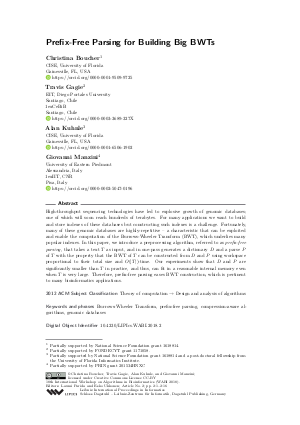Prefix-Free Parsing for Building Big BWTs
Authors
Christina Boucher  ,
Travis Gagie
,
Travis Gagie  ,
Alan Kuhnle
,
Alan Kuhnle  ,
Giovanni Manzini
,
Giovanni Manzini 
-
Part of:
Volume:
18th International Workshop on Algorithms in Bioinformatics (WABI 2018)
Part of: Series: Leibniz International Proceedings in Informatics (LIPIcs)
Part of: Conference: International Conference on Algorithms for Bioinformatics (WABI) - License:
 Creative Commons Attribution 3.0 Unported license
Creative Commons Attribution 3.0 Unported license
- Publication Date: 2018-08-02
File

PDF
LIPIcs.WABI.2018.2.pdf
- Filesize: 0.69 MB
- 16 pages
Document Identifiers
Subject Classification
ACM Subject Classification
- Theory of computation → Design and analysis of algorithms
Keywords
- Burrows-Wheeler Transform
- prefix-free parsing
- compression-aware algorithms
- genomic databases
Metrics
- Access Statistics
-
Total Accesses (updated on a weekly basis)
0PDF Downloads0Metadata Views
Abstract
High-throughput sequencing technologies have led to explosive growth of genomic databases; one of which will soon reach hundreds of terabytes. For many applications we want to build and store indexes of these databases but constructing such indexes is a challenge. Fortunately, many of these genomic databases are highly-repetitive - a characteristic that can be exploited and enable the computation of the Burrows-Wheeler Transform (BWT), which underlies many popular indexes. In this paper, we introduce a preprocessing algorithm, referred to as prefix-free parsing, that takes a text T as input, and in one-pass generates a dictionary D and a parse P of T with the property that the BWT of T can be constructed from D and P using workspace proportional to their total size and O(|T|)-time. Our experiments show that D and P are significantly smaller than T in practice, and thus, can fit in a reasonable internal memory even when T is very large. Therefore, prefix-free parsing eases BWT construction, which is pertinent to many bioinformatics applications.
Cite As Get BibTex
Christina Boucher, Travis Gagie, Alan Kuhnle, and Giovanni Manzini. Prefix-Free Parsing for Building Big BWTs. In 18th International Workshop on Algorithms in Bioinformatics (WABI 2018). Leibniz International Proceedings in Informatics (LIPIcs), Volume 113, pp. 2:1-2:16, Schloss Dagstuhl – Leibniz-Zentrum für Informatik (2018)
https://doi.org/10.4230/LIPIcs.WABI.2018.2
BibTex
@InProceedings{boucher_et_al:LIPIcs.WABI.2018.2,
author = {Boucher, Christina and Gagie, Travis and Kuhnle, Alan and Manzini, Giovanni},
title = {{Prefix-Free Parsing for Building Big BWTs}},
booktitle = {18th International Workshop on Algorithms in Bioinformatics (WABI 2018)},
pages = {2:1--2:16},
series = {Leibniz International Proceedings in Informatics (LIPIcs)},
ISBN = {978-3-95977-082-8},
ISSN = {1868-8969},
year = {2018},
volume = {113},
editor = {Parida, Laxmi and Ukkonen, Esko},
publisher = {Schloss Dagstuhl -- Leibniz-Zentrum f{\"u}r Informatik},
address = {Dagstuhl, Germany},
URL = {https://drops.dagstuhl.de/entities/document/10.4230/LIPIcs.WABI.2018.2},
URN = {urn:nbn:de:0030-drops-93044},
doi = {10.4230/LIPIcs.WABI.2018.2},
annote = {Keywords: Burrows-Wheeler Transform, prefix-free parsing, compression-aware algorithms, genomic databases}
}
Author Details
Funding
- Boucher, Christina: Partially supported by National Science Foundation grant 1618814.
- Gagie, Travis: Partially supported by FONDECYT grant 1171058.
- Kuhnle, Alan: Partially supported by National Science Foundation grant 1618814 and a post-doctoral fellowship from the University of Florida Informatics Institute.
- Manzini, Giovanni: Partially supported by PRIN grant 201534HNXC
Supplementary Materials
- Source code: https://gitlab.com/manzai/Big-BWT
References
- rsync. URL: https://rsync.samba.org.
- Repetitive corpus. URL: http://pizzachili.dcc.uchile.cl/repcorpus.html.
- The sort transformation. URL: http://www.compressconsult.com/st.
-
Michael Burrows and David J. Wheeler. A block-sorting lossless compression algorithm. Technical report, Digital Equipment Corporation, 1994.

-
H.A. Carleton and P. Gerner-Smidt. Whole-genome sequencing is taking over foodborne disease surveillance. Microbe, 11:311-317, 2016.

-
Chia-Hua Chang, Min-Te Chou, Yi-Chung Wu, Ting-Wei Hong, Yun-Lung Li, Chia-Hsiang Yang, and Jui-Hung Hung. sBWT: memory efficient implementation of the hardware-acceleration-friendly Schindler transform for the fast biological sequence mapping. Bioinformatics, 32(22):3498-3500, 2016.

-
Paolo Ferragina, Travis Gagie, and Giovanni Manzini. Lightweight data indexing and compression in external memory. Algorithmica, 63(3):707-730, 2012.

-
Paolo Ferragina and Giovanni Manzini. Indexing compressed text. Journal of the ACM (JACM), 52(4):552-581, 2005.

-
Travis Gagie, Gonzalo Navarro, and Nicola Prezza. Optimal-time text indexing in bwt-runs bounded space. In Proceedings of the 29th Symposium on Discrete Algorithms (SODA), pages 1459-1477, 2018.

- Ben Langmead and Steven L Salzberg. Fast gapped-read alignment with Bowtie 2. Nature Methods, 9(4):357-360, 2012. URL: http://dx.doi.org/10.1038/nmeth.1923.
-
Ben Langmead, Cole Trapnell, Mihai Pop, and Steven L Salzberg. Ultrafast and memory-efficient alignment of short DNA sequences to the human genome. Genome biology, 10(3):R25, 2009.

-
Heng Li and Richard Durbin. Fast and accurate long-read alignment with burrows-wheeler transform. Bioinformatics, 26(5):589-595, 2010.

-
Ruiqiang Li, Chang Yu, Yingrui Li, Tak-Wah Lam, Siu-Ming Yiu, Karsten Kristiansen, and Jun Wang. Soap2: an improved ultrafast tool for short read alignment. Bioinformatics, 25(15):1966-1967, 2009.

-
Felipe Alves Louza, Simon Gog, and Guilherme P. Telles. Inducing enhanced suffix arrays for string collections. Theor. Comput. Sci., 678:22-39, 2017.

-
MetaSUB International Consortium. The Metagenomics and Metadesign of the Subways and Urban Biomes (MetaSUB) International Consortium inaugural meeting report. Microbiome, 4(1):24, 2016.

-
Ge Nong. Practical linear-time O(1)-workspace suffix sorting for constant alphabets. ACM Trans. Inf. Syst., 31(3):15, 2013.

-
Alberto Policriti and Nicola Prezza. From LZ77 to the run-length encoded burrows-wheeler transform, and back. In Proceedings of the 28th Symposium on Combinatorial Pattern Matching (CPM), pages 17:1-17:10, 2017.

-
Jouni Sirén. Burrows-Wheeler transform for terabases. In Proccedings of the 2016 Data Compression Conference (DCC), pages 211-220, 2016.

-
E.L. Stevens, R. Timme, E.W. Brown, M.W. Allard, E. Strain, K. Bunning, and S. Musser. The public health impact of a publically available, environmental database of microbial genomes. Frontiers in Microbiology, 8:808, 2017.

-
Eric L. Stevens, Ruth Timme, Eric W. Brown, Marc W. Allard, Errol Strain, Kelly Bunning, and Steven Musser. The public health impact of a publically available, environmental database of microbial genomes. Frontiers in Microbiology, 8:808, 2017.

-
The 1000 Genomes Project Consortium. A global reference for human genetic variation. Nature, 526:68-74, 2015.

-
C. Turnbull et al. The 100,000 genomes project: bringing whole genome sequencing to the nhs. British Medical Journal, 361:k1687, 2018.

